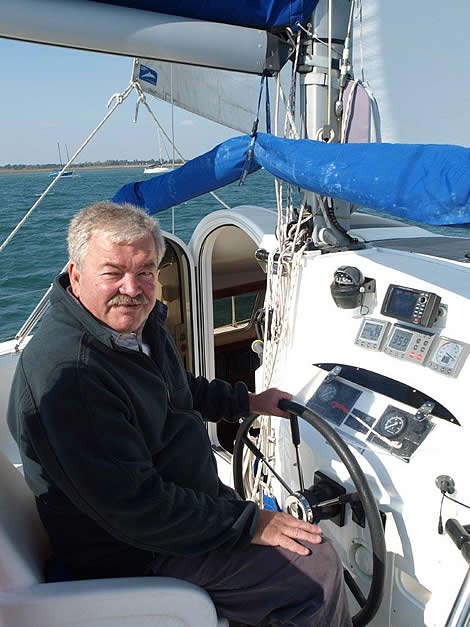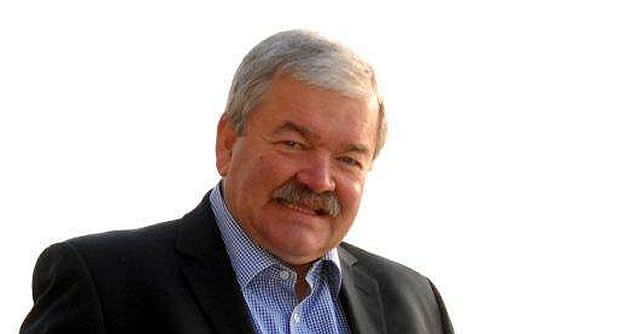Rod Carr's final take
Anyone who visited the Royal Yachting Association’s offices in Eastleigh in 2000 and then dropped in on the Hamble HQ ten years later would understand instantly the effect Rod Carr has had on the organisation over the decade.
Back then, the higgledy-piggledy Victorian warren had an air of worthy amateurism about it reflecting the organisation’s culture. Today the new bespoke office complex overlooks Southampton Water, its car park filled with sponsored Volvo cars, the 150 staff are busy and mostly RYA branded and UK sailing’s control centre appears to be exactly that.
When he took over as CEO, 16 years after joining the RYA as Olympic team coach for the 1984 Los Angeles Games, one of the first things Rod Carr did was to get his calculator out and work out whether they could afford brand new purpose built offices. The calculator was a trusty friend following his success three years previously in landing the first £3 million tranche of lottery cash, specifically for use in winning Olympic medals. This time too, the number crunching had a jackpot feel to it.
“We already had a bit of cash and were confident about our training schemes and the income streams they generated," recalls Carr. "Our membership was rising because we were becoming more relevant to recreational boaters and standing up for their rights. Our sailors were also starting to perform on the international stage. All that gave us the confidence to move offices. It was really important to give people a proper working environment and it was an important part of changing the culture.”
That process was stepped up following the McKinsey Review in 2002, a process instigated by Carr, scrutinising every aspect of its structure and operations. Another step change, especially in the definition of roles for executive staff as distinct from the armies of volunteers, provided Carr with a career highlight since it meant the RYA was starting to resemble the kind of organisation he’d set out to create.
Since then, the RYA has become an efficient multi-faceted organisation, respected around the world for its high training standards, professional lobbying skills and of course its remarkable success in putting Britain on the Olympic podium time and again.
Two years before this success reaches a likely climax at London 2012, Carr has stepped down as CEO, but this seminal change in culture forms the key part of a fitting legacy.
“The RYA now holds the values of an association but conducts its affairs in a businesslike way,” said Carr the day before he left Hamble having served the RYA for 25 years.
His long list of achievements is topped by three proud boasts. The Olympic gold rush that started at Sydney in 2000 did not happen by accident. It was part of a long process that stemmed from a wake up call he received at the 1984 Olympics in Los Angeles.
“In the closing ceremony, there was a call for all medal winners to move to the left and stand in a line. The entire American team who had all won a medal of some description moved to the left and stood in line and I thought f**k that. You must be joking! I used to wake up at night thinking about that moment.”
It was one of the lowest moments of his career but as is often the case with fits of despair, it produced a clear vision of where Britain needed to be in world sailing and what was required to get there.
It took him and youth coach Jim Saltonstall around 15 years to put together a training and management structure to maximise the talents of Britain’s young sailors. Their vision was not embraced by everyone at the RYA until they identified and addressed a main sticking point.
“We knew we had to get rid of the politics – every class had a representative fighting for the meagre spoils, so we were over democratised. Many of them were not sailors with no performance perspective – they were just a bunch of worthy people.
“So in 1993 we set up the Olympic Steering Group of just four people. No one was aligned to an Olympic class but all of us had experience of the Olympics so there was a real awareness of performance.
“We were much more strategic in the way we went about things so everybody knew exactly what the game was and what they had to do to be part of the British team. We allocated resources on the basis of likely success not fairness. It was alien culture to most governing bodies – in effect we became a meritocracy.”
The committee instigated a set of values that continue to hold true today. “We decided that Olympic campaigns had to belong to the sailors not the RYA. They were given access to all the team coaches and managers but at end of the day, they had to take responsibility and ownership for their campaign because they are the ones who are out there on the start line.”
Sydney, where Ben Ainslie, Iain Percy and Shirley Robertson all won gold, was a high point in his RYA career he says. Britain was the top sailing nation in 2000 and has been ever since, winning a total of 16 medals including nine golds.
Along with rowing and cycling, sailing has been at the forefront of Britain’s Olympic campaign. Ainslie, Percy and the ‘three blondes in a boat’ have become household names and the future looks equally bright.
“We have people pushing for places in every class. It is difficult to say how many medals we will get in Weymouth – it is too early to call. I couldn’t say for certain that we will get more medals than last time though we are slightly ahead than where we were at this stage in the last cycle and the fact that the America’s Cup won’t take place until 2013 is helpful.
“When you are winning medals in more than half the classes you start from a very high base but hopefully we will be top nation again.”
It’s not just the silverware that Carr is proud of. The RYA has introduced 200,000 youngsters to sailing and windsurfing through its OnBoard programme and it has become more relevant to more recreational boaters not just in the UK but around the world.
There are now over 2,200 training centres in 23 countries, 18,000 instructors and 155,000 people taking part in over 100 professional and recreational courses each year.
The organisation has developed a strong voice in Whitehall having become a trusted lobbyist and advisor to the Government on a range of matters that boaters hold dear to their hearts. Red diesel, boat registration, border patrols and drinking at sea have all forced the RYA into the corridors of power to limit the onslaught of regulation.
“It will be interesting to see if the overregulated culture that governs our society extends into recreational boating in the future,” says Carr. “It hasn’t at the moment but there are clamours for more registration, of people and of boats and that could affect participation and enjoyment in the sport.”
He is also fearful of the cuts that are bound to be imposed after London has staged its sporting extravaganza in August 2012.
“I will be surprised if there is not some adjustment in 2013,” he says. “I don’t think it will be drastic because in a society that is becoming more obese and inactive it would be counterproductive to spend less on sports that make people less obese and give them a greater sense of well being. Intelligent policy makers respect that. It would be a brave politician who would do anything to destroy the atmosphere and euphoria that will inevitably result from 2012.”
The loss of two immensely talented Olympic sailors John Merricks and Glynn Charles on his watch in 1997 count as low points of his time at the RYA and he is hoping his disappointments in failing to arrest the decline in dinghy sailing in the UK and in sailing generally among women will be reversed by his replacement Sarah Treseder who took over at the end of February.
But what of Carr in 2012 when sailing will inevitably be the toast of international sport? Only a fool would bet against him being involved in Weymouth in some capacity.
As a director of the Weymouth and Portland Sailing Academy, he will be anxious to ensure the venue is an impeccable host and if the rumours about him joining LOCOG, the London Organising Committee, are to be believed, his authority and influence in international sport may about to be going stratospheric. His charity work with the Outward Bound Trust will add to the workload as will his consultancy work with some of sailing’s emerging nations such as Oman.
His talent for straight talking and getting things done are likely to attract plenty of offers over the next few years which could make proper ‘retirement’ a distant dream. His wife Lynne who has waited years for Carr to free up more time to cruise in the Scottish Highlands aboard their catamaran might just have to wait a little while longer.











Latest Comments
Add a comment - Members log in